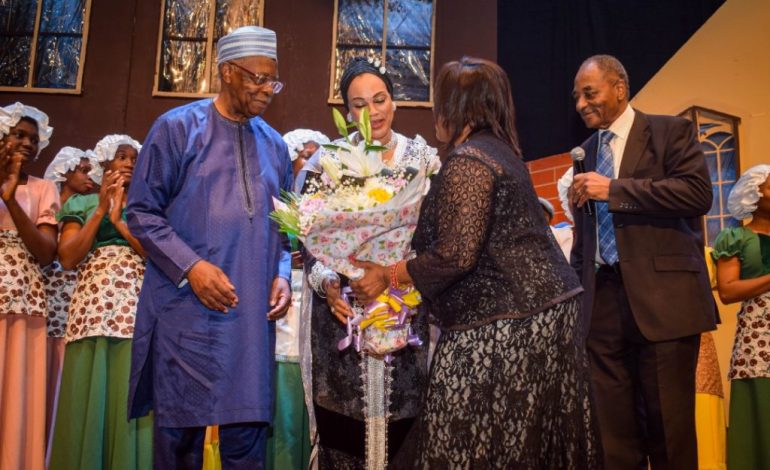Opera ‘Cavalleria Rusticana’ performed in honour of Daisy Danjuma at MUSON Festival 2022

By Anote Ajeluorou
OPERA performance is one of the main features of the yearly MUSON Festival since the culture centre started its festival run. The 2022 edition of MUSON Festival was no exception. An Italian opera titled Cavalleria Rusticana (Italian for Rustic Chivalry) was what the festival organisers settled for. For an opera sung entirely in Italian, one could only imagine the huge efforts the performers put into it to get into the Italian operatic mood to entertain the highflying audience that included Gen. TY Danjuma (rtd) and his wife Daisy Danjuma for whom the opera was performed as his husband’s 70th birthday gift. It was performed by MUSON Opera Department and sponsored by Gen. Danjuma.
Other guests included Publisher of The Guardian newspaper, Mrs. Maiden Ibru and the entire management and Board of Trustees of MUSON Centre including its chairman, Mr. Louis Mbanefo.
Cavalleria Rusticana is an opera in one act by Pietro Mascagni (set) to an Italian libretto by Giovanni Targioni-Tozzetti and Guido Menasci, and adapted from an 1880 short story of the same name and subsequent play by Giobanni Verga. Opera is a genre of classical music which theatrical performance is sung rather than spoken as dialogue that plays enploy, from beginning to the end. The storyline is a familiar one, of a love story gone awry. Turiddu (tenor) is madly in love with Lola (mezzo soprano), but national duty calls and he leaves for war. But by the time he returns from war, the treachery of love has hit his love nest, his Lola, a wench of fleeting feelings, has since moved on and is married to his townsman, Alfio (baritone).
Of course, Turiddu is heartbroken and feels betrayed by Lola. But he recognises the reality of the situation, and manages to move on. He settles for lovely Santuzza (soprano) as wife-to-be, and is only waiting for the right time to consummate their love. But the moment Lola learns that Turiddu has returned from war, her fleeting affection swings 360 degrees, and she begins to warm up to Turiddu again in an obvious act of infidelity to her husband Alto.

Of course, old heart flames die too slowly, as it turns out. Turiddu finds he is unable to truly move on as Lola begins showing him renewed affection. He’s still in love with Lola, and begins to find Satuzza less and less attractive, and less to his taste. When Santuzza notices the growing affection and re-establishment of intimacy between Lola and her man, Turiddu, she turns to Turiddu’s mother Lucia (contralto) and cries out to her for help, about the great betrayal she is suffering in the treacherous hands of her son whose heart has turned from her to another woman. She appeals to her motherly instincts to intervene. It’s such a moving scene, Santuzza’s earnest appeal for Turiddu’s mother’s understanding of the affection and love she bears her son, and how it is slipping away from her bosom on account of another woman who’s probably more sensual and endowed than her, and who is bent on stealing her son’s heart. Turiddu’s mother is aghast at the situation, but she is unable to intervene. She does not confront her son about it apart from showing distress about the unfortunate turn of affairs.
Of course, an opera is a dramatic work in one or more acts, set to music for singers and instruments. Cavalleria Rusticana is an Italian opera sung in Italian language entirely although the audience, mainly English speaking, had the extra trouble of watching the performance on stage and reading the translation of the Italian songs being scrolled on a screen high up to the left of the stage. The producer was also the music conductor, whose focus was on the two musicians on two grand pianos, who combined dexterously to produce the moving music that accompanied the Italian songs that the actors sung instead of using the usual dialogue in stage performances.
When by chance Alfio meets Santuzza, the wounded maiden does not hesitate to relate to him the waywardness of his wife and her man, how she is consorting with another man, her own Turiddu. Alfio’s feels Santuzza is making false claims, but when Santuzza swears to the truthfulness of her claims regarding Alto’s wife and her Turiddu, Alfio is heartbroken and then swears vengeance and goes in search of the man cuckolding him. The action takes place on Easter Sunday while the town is in festive mood for the feast of resurrection of Christ, with the church as the centre of activities. The town’s folks go to church and merry, but beneath it all is the festering of a man’s wounded pride and illicit affection being traded. Alto finds Turiddu in a bar after church service and refuses to shake hands to which Turiddu understands. He does not deny the charges of cuckolding Alfio, wherein Alto challenges him to a duel to the death in an orchard to which Turiddu agrees. Lola, on noticing her precarious situation, with Turiddu and Alfio at each other’s throats with the town’s people keeping away from getting involved, quietly slips away from the two men to whom her life is torn between. She leaves them to sort themselves out as chivalrous men were wont to do in ancient times. Even the town’s folks never intervenes in the love dispute, as they leave the two men to their own devces.
When Turiddu meets his mother, he speaks to her of embarking on an uncertain journey although he does not disclose to her the nature. But the heartbroken mother is not exactly ignorant of the matter, since Santuzza has cried her heart out to her about the messy love triangle between her, her Turiddu and Lola. What is worse, she does not confront her son about abandoning Santuzza for Lola, a woman who betrayed him when he went to war. And she feels helpless in stopping her son from going ahead to the uncertain journey of having a duel with Alto. Turiddu only asks that his mother kisses him as she did when he was going to war. But a fighting war is not something of his own making, being a national call to service of the fatherland. He went to war and came back alive, unscathed. However, injuring another man’s pride by taking his wife is another kind of war entirely. The kiss he extracts from his mother does not provide sufficient armour against the injustice of stealing another man’s wife. Although Turiddu is a soldier who’d gone to war and back, the sheer guilt of his consorting with another man’s wife would seem to have effectively sucked the soldierly strength from him, as he proves no match for Alfio, possibly a mere peasant on whose side is the justice of love, if there were such a thing. Alto kills Turiddu in the duel. The impact of the news soon hits his mother so hard she also joins her son; there isn’t much to live for after all with his son having been killed for loving the wrong woman.

Although there was the trouble of having to read from a screen to make sense of the Italian songs that also serves as the lines (dialogue) being delivered by the actors on stage, Cavalleria Rusticana is a delightful musical performance showpiece. What is more, it was performed in honour of the wife of a soldier like Turiddu, Gen. Danjuma whose wife recently turned 70 years in age. How symbolic! Of course, Gen. Danjuma and his wife didn’t fall to the fickleness of Turiddu and Lola’s love. It’s why they have lived and loved for over 40 years as husband and wife. Turiddu and Lola’s love is a moral lesson that is ageless: remaining true to one’s true love is key to peace of mind and longevity.
And the actors of Cavalleria Rusticana did a splendid job of mastering the songs and singing them with utmost gusto, with the right cadence in the right place. Angela Akwanrandu who performed the part of Santuzza was sublime in her woe begotten performance, of a heartbroken woman crying out her woes. The performance revolved around her. She had most lines to sing as the one carrying the burden of betrayed love and abandonment. She gave her all to make her part come alive. The entire performance rested on her shoulders, and she delivered superbly. Turiddu (Valentine Raymond Anosike) was as much a moron as they come, men who are easily smitten and caught in a love web. Alfio (Daniel Ozioma) is the injured fool of a husband who believes fighting to the death is the only way to redeem his battered honour. Lola (Uche Aghulor) is the unmistakable wench that lures men to their death, and Lucia (Vera Onah) is the matronly figure who is helpless in the face of the fickleness of young men and women’s hearts that easily get swayed from the path of honour. It was sheer joy listening to the different classical voices as they alternated from one to the other, from suprano to contralto to baritone to tenor and then back again, deftly weaving in and out of each other sand and performed.
However, the challenge now is for Nigerian musicologists to attempt something in the range of opera Cavalleria Rusticana, and perhaps even do it better. If Nigerian musician-actors could deliver an Italian opera like they did with Cavalleria Rusticana, then a Nigerian version can be written and performed in much the same light to the delight of opera lovers. The director and conductor of of Cavalleria Rusticana John Lucien Eclou did a great job of harmonising the music and the songs. He’s also in the best position to possibly write a Nigerian opera. What he perhaps needs is for MUSON Centre to commission him to write one for the next MUSON Festival 2023! There’s no doubt that he and his crew can, and will deliver.



